
The Systemic Way
This podcast gives the listener an opportunity to hear conversations with people from the field of systemic psychotherapy. Host Sezer and Julie, two systemic and family psychotherapists, discuss a wide range of topics, theories, practices and experiences with their guests, giving the listener an insight into this disciplines contribution to social change.
Artwork by Arai Drake Creative: http://www.araidrake.com/portfolio/thesystemicway/Music by Rena Paid
We are now being supported by the Association of Family Therapy (AFT).
The Systemic Way
Critical Realism and The Philosophy of Open Systems: In Conversation with David Pocock.
David Pocock , Systemic Family Psychotherapist, Psychoanalytic Psychotherapist, author and lecturer, joins us to discuss his influential paper, "A Philosophy of Practice for Systemic Psychotherapy: The Case for Critical Realism." (2015) In this session, we revisit the paper almost ten years after its initial publication to examine its enduring themes and its significant contribution to the field of family therapy. David explains what critical realism is and how it manifests in therapeutic practice, highlighting its role in bridging the gap between structuralism and post-structuralism and combines moderate realism with moderate constructionism.
David provides an accessible and insightful overview of the paper, demonstrating how critical realism supports a coherent, accountable, and robust understanding of therapeutic practice. Through this discussion, we gain a deeper appreciation for the practical applications of critical realism in systemic psychotherapy, and how it enhances the therapist's ability to navigate complex relational dynamics within diverse family systems. This review underscores the continued relevance and value of critical realism as a philosophical foundation for effective and ethical therapeutic practice.
Reference:
Pocock, D. (2015). A philosophy of practice for systemic psychotherapy: The case for critical realism. Journal of Family Therapy, 37(2), 167-183.